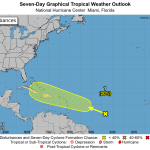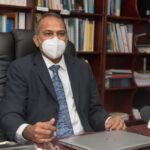2023 marks the year when the Government of Antigua and Barbuda’s mandate for
gender equality and women’s empowerment and its vision for the optimal health and
well-being of the residents of Antigua and Barbuda joined ranks under the same
Ministry.
At a time when the nuances of gender and women’s issues are being treated
as cross cutting for all sectors internationally, the assignment of the Directorate of
Gender Affairs (DOGA) under the Ministry of Health provides a unique opportunity to
examine the efficacy of public health services on the lives of women in
commemoration of International Women’s Day 2023.
The public health space in Antigua and Barbuda is a sector largely used by
women. Of the roughly 49% of Antiguans and Barbudans who depend solely on public health services1, women particularly in lower- income or vulnerable households, have
predominately taken advantage of the ever- expanding services in the sector.
In addition to the availability of tertiary care at the Sir Lester Bird Medical Centre (SLBMC),
many of which are free of cost for residents, the existence of primary and secondary care at the community clinics includes maternal, adolescent, and child health services, reproductive health services and the treatment and monitoring of sexually transmitted infections and diseases (STI/STD) including HIV2, allowing women to easily access healthcareservices which are specific to their needs.
For example, 100% of women in Antigua and Barbuda can access, free of cost, a range of contraceptive options at the community clinics and the Antigua and Barbuda Planned Parenthood Association (APPA), including condoms, combined oral contraceptive pills, contraceptive injections and the Intrauterine device or coil (IUD).
Another example is the Ministry of Health’s Cervical Screening Project which launched
in September 2022 through collaboration with the Pan-American Health Organisation
(PAHO) and Basic Health International (BHI). This project was ideal for demonstrating
women’s response to new and innovative methods in healthcare. The project was
based on the World Health Organisation’s (WHO) policy for the elimination of cervical
cancer through vaccination, screening, early detection, and the treatment of
precancerous lesions.
The project screened nearly 1,600 women for the Human Papilloma Virus (HPV) in
four (4) months, exceeding its target of 1,500 women in six (6) months. The traditional
method of cytology testing was replaced with the innovative and high-performance
PCR HPV testing which proved more sensitive for detecting HPV in a shorter period.
The delivery of screening at the local community clinics ensured that mostly women
from vulnerable households were able to access HPV testing and where necessary,
receive treatment for precancerous lesions.
This feat is not to be underestimated due to the high rates of cervical cancer in the
twin island state. According to Chair of the Cervical Cancer Task Force and Lead on
the HPV Implementation Project, Dr. Cherie Tulloch, cervical cancer is the most
common gynaecological cancer being treated at the Sir Lester Bird Medical Centre
(SLBMC) Oncology Department and Antigua and Barbuda is reported to have one of
the highest rates of cervical cancer in the Eastern Caribbean region.
Only 13% of women seeking treatment at SLBMC were Stage One, meaning that over 80% of women were in advanced stages when seeking treatment for this preventable cancer.The approach for essentially universal healthcare not only benefits women but also
the Ministry of Health. With most women able to access maternal health services
throughout their pregnancy thus allowing medical professionals to identify and treat
early complications, Antigua has been able to consistently reduce its maternal and
infant mortality rate yearly, resulting in maternal mortality of less than 70 per 100,000
live births, and achieving a target under the Sustainable Development Goals (SDG)
for ensuring healthy lives and promoting well-being.
In addition, universal access to sexual and reproductive healthcare services and the
resulting increase in women accessing early maternal care has contributed to Antigua
and Barbuda’s certification as one of eight (8) Caribbean territories and states to
eliminate mother-to-child transmission of HIV and Syphilis10 and has maintained this
certification as of 2022. Initiatives such as free access to contraceptives at the
community clinics may also be considered a contributory factor to the decreasing rates
of adolescent fertility in the twin island state, which has seen a 36.8% decrease
between 2000 and 2022.11 In addition, Antigua and Barbuda stands as the first country
to undergo comprehensive training for the elimination of cervical cancer through the
WHO’s HPV Manual.
12 In addition to international recognition, these programs serve
as a smart investment for the government. The programs can reduce incidences of
financial catastrophic and medical impoverishment among vulnerable households as
well as reduce health and social government expenditure on catastrophic health
incidents as well as social welfare programs caused by unwanted and unplanned
pregnancies or reproductive health emergencies which the government may be forced
to pocket.
Initiatives in health sectors not specific to women but for which women tremendously benefit must not be ignored. Antigua and Barbuda now has two (2)
resident psychiatrists as well as immediate access to other
psychiatrists within the Eastern Caribbean.
The country has also appointed psychiatric nurses in the community clinics
which has helped reduce the burden on the island’s sole
public mental facility.This has allowed increased access to mental health services in
general and for women.
According to Superintendent of Public Health Nurses (SPHN),
Ms. Almarie Roberts-Coates,the increased access to mental health services has not only been ideal for the early detection or onset of mental and emotional challenges but particularly among women, has opened conversations on postpartum depression, a condition often misunderstood, as well as conversations on the impact of self-care and self-love on women’s health.
Women have not only served as the major beneficiaries of the public health sector but
are also agents of change in the sector. While the initial image of healthcare is often
a man in a white coat with a stethoscope around his neck, the ‘motor’ of the sector is
a woman in white attire and orthopaedic shoes, consistently interacting with patients,
monitoring vitals and providing 24/7 bedside care to the residents of the sole public
hospital.
This was particularly evident during the height of the coronavirus disease
2019 (COVID-19) pandemic where nurses provided 24-hour primary care in the face
of increased exposure, no vaccines, and limited treatment for an obscure virus in this
area of the world. According to Nurse Almarie Roberts-Coates, the COVID-19
pandemic publicly displayed not only the importance of nurses but their resilience in
undertaking the role of health provider, therapist, activist, and supervisor for the
thousands of persons infected and affected while maintaining their other healthcare
duties. Over the past ten (10) years, women have even begun to dominate as the persons in
the “white coat with the stethoscope” as well as adjudicating figures in the sector.
Based on data from Antigua and Barbuda’s Medical Association, most licensed
medical practitioners in Antigua, particularly those who live and work continuously on
the island, are women.16 The Chief Medical Officer (CMO), Deputy CMO, and
Permanent Secretary of the Ministry of Health, key personnel in the development and
push of public health policies are women, signalling that higher educational attainment
at the tertiary level by women is now translating into equal access to economic
opportunities and decision-making positions.
The public health sector has certainly made significant strides in women’s health and
leadership; however, the work is far from over, particularly when maintaining
momentous achievements.
CMO, Dr. Rhonda Sealey-Thomas who also chairs
PAHO’s regional validation committee responsible for the validation and revalidation
of countries of the EMTCT of HIV and Syphilis, noted that the Ministry of Health’s
priorities over the next five years will be the updating of its National Strategic Health
Plan (NSHP) which expired in 2019, and the physical improvement of healthcare
facilities.
Whereas the NSHP previously included limited reference to sexual and
reproductive health services, an updated plan will include a greater focus on these
services, particularly in light of Antigua’s elimination of mother-to-child HIV and
Syphilis transmission and the island’s intention to maintain this certification. From the
NSHP will emerge other critical policies including updated policies on NCD, HIV/AIDS
reduction as well as Mental Health Access, and an improved system of monitoring and
evaluation to track the success of the policies.
The improvement of healthcare facilities will include the building of modern purpose-
built facilities and the continued introduction of technologies, particularly in community
clinics. One such immediate facility is the Fiennes Institute19, a plan no doubt
welcomed by the women working and residing in the current facility.
2023 has been a critical year for the future of Antigua and Barbuda. The recent election
and the newly appointed government mean the establishment of new priorities, some
policies, and plans for the continued development of the country. This reflection on the
impact of public health services on the lives of women demonstrates the importance
of mainstreaming gender in public health policy.
This means ensuring that the needsof women and men are identified and accurately reflected in public health policies and
service options, considering intersectional factors of poverty, income, disability,
location, and other indicators of vulnerability. Current initiatives show that women will
access healthcare services once such initiatives are, accessible, affordable and
appropriate to their specific needs. As such, the Women of Antigua and Barbuda wait
eagerly for the next level of public healthcare.










